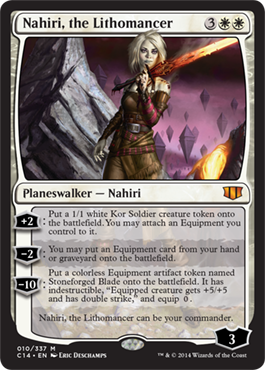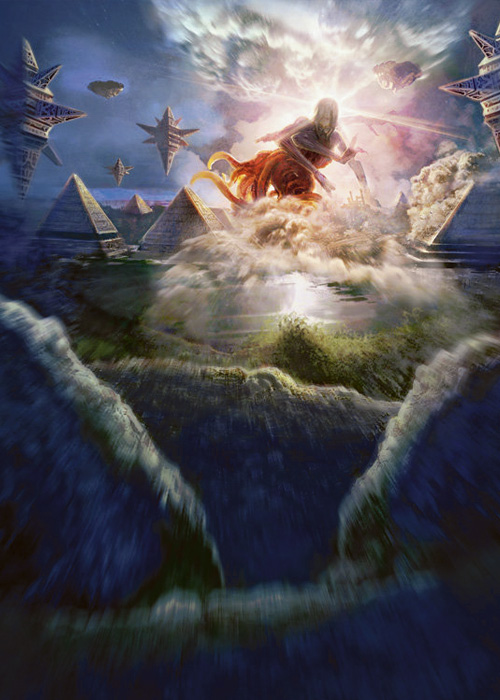The Lithomancer
Long ago, the world-devouring Eldrazi were sealed away on Zendikar by three Planeswalkers: the spirit dragon Ugin; the vampire Sorin Markov; and a third Planeswalker called the Lithomancer, about whom little is known in the present day.
Today, we look back in time, more than 6,000 years ago, to a plane whose name is lost to history.
Today, we meet the Lithomancer.
A rampart of stone rose out of the bare earth, encircling the small encampment on what had been an open and vulnerable plain. It was smoothly curved, with elegant crenellations.
Nahiri, called the Lithomancer, surveyed her work and frowned. It was well made, and under good conditions it would stand for centuries.
These were not good conditions.
There were perhaps a hundred refugees left. Tomorrow, they would move camp again, or risk being overrun by these…things, whatever they were. They were abominations, things out of nightmare, and Nahiri didn't bother to hate them. What difference would it make?
"May I have a word with you, Nahiri?"
The clipped, dry voice was right behind her, close enough that she should have heard the man walk up to her, should have felt his breath on her neck. But he walked like a cat, and he drew no breath, and the thought of his lips so close to her throat made her shudder. Vampire.
She'd known he was there anyway—he was walking on bare stone, after all—but he himself had told her not to let anyone know all her tricks. Not even her friends, which she wasn't at all sure he was.
She turned to face Sorin Markov—vampire, fellow Planeswalker, protector of the plane called Innistrad, and the closest thing she had to a friend in this place so far from the world of her birth.
They made a striking pair, and the refugees—human, dark-haired, and ruddy-cheeked—gave them plenty of space. His hair was as white as hers, but his skin was ash-gray where hers was alabaster. It was his eyes that unmistakably marked him as alien: black where they should be white, with bright, unnerving irises.
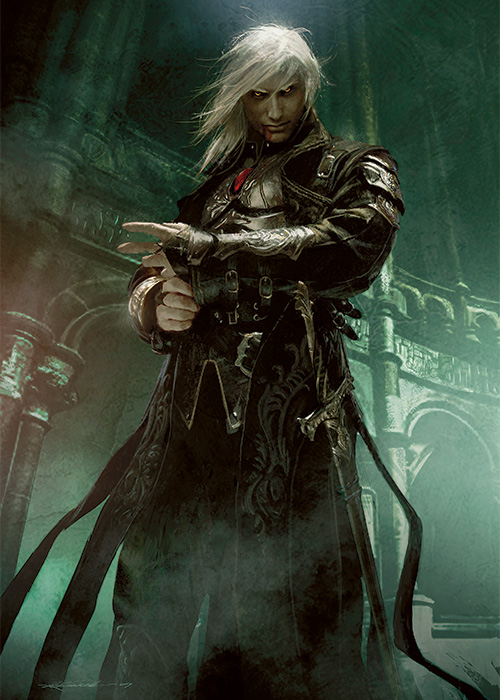
They picked their way between the refugees' cook fires to the edge of the camp, where Nahiri's wall encompassed a low, rocky outcropping. They stood and looked out over the wall. The sun was dropping low over the hills ahead of them, and the hideous shapes in the valley were falling mercifully into shadow.
"You've made their camp for them," said Sorin. "Again. I think it's time we left them to their own efforts."
"No," said Nahiri. "We're here to save them."
"You're here to save them," said Sorin. "I'm here to stop these creatures, on this world, before they spread to others—to mine, or to yours."
Down in the river valley, dark shapes writhed. The sounds of camp life were muted.
"I can't stand to watch them suffer," she said.
"Then turn away," said Sorin, "and look at the bigger picture."
Nahiri glanced back at the camp. Some of the refugees were watching the two Planeswalkers.
"And what is the bigger picture?" she asked quietly. "Are we winning?"
Sorin stared down at the rippling darkness, still as a statue.
"No," he said.
His sharp features were shadowed. Was that guilt at their failure? Or contempt at their weakness? Did she even want to know?
"We could stand and fight," he said. "Together, we might turn the tide. But we couldn't keep these people safe at the same time."
"Not an option," said Nahiri. "For all we know, they're the last people alive on this plane. We have to save them. We have to try."
"Well then," said Sorin, too loudly. "Let's sit and hold their hands while they pass into oblivion, and let these monsters go on to devour other worlds. I'm sure they'll take a great deal of comfort in knowing that we tried."
She glanced back at the refugees. They were no longer watching the Planeswalkers, their eyes locked on whatever small tasks occupied their shaking hands. All except one.
The girl was about fifteen, and her eyes were cold.
Nahiri wanted to say something, anything, that might be of comfort. No words came. She could promise no salvation, and no victory—could promise nothing, except to try. And after Sorin's outburst, the sentiment rang hollow.
She turned away from Sorin and walked down off the outcropping. She stopped in front of young woman with the cold, hard eyes.
"What's your name?" she asked.
"Lian," said the girl.
"Can you use a sword?"
Lian nodded. She was unarmed.
Nahiri reached out to a nearby stone and let an old spell awaken inside her, a spell she had learned when she was still mortal, and still young. There was metal in stone, and this stone was every stone. She plunged her hand into the living rock, which melted and foamed around her milk-white hand.
Some of the refugees gasped. Sorin frowned. The girl just watched.
Nahiri called to the metal in the stone, and felt her hand close around the hilt of a sword. She pulled, and an elegant blade slid free of the molten rock.
She held it up for a moment, letting it shine in the setting sun, drawing away the heat of its forging until it was cool to the touch. She offered it to Lian.
"This is your world," she said. "This stone, this earth, is yours to fight for. If you don't think you can rely on us, then don't."
Lian took the sword, tested its weight and its balance.
"We're all going to die, aren't we?" she said, quietly.
"I don't know," said Nahiri. "But if you are, you can at least die fighting."
Lian nodded.
Nahiri turned back to Sorin.
"Lovely," he said, this time softly enough that only she could hear. "I suppose false hope is better than none."
"Any hope is better than none," said Nahiri. "Always."
Sorin frowned, but before he could answer, the earth rumbled. Nahiri stumbled, but kept her feet. There'd been small tremors throughout the day, but nothing like this.
The valley floor lay in full shadow, with the writhing, sinewy bodies of the enemy moving within it, all sickly colors and twisted shapes. But they had fallen strangely still, for the first time in the weeks that Sorin and Nahiri had been fighting them. They turned to the west, toward the setting sun, and began to sway.
Then a figure, impossibly large, rose up behind the hills on the far side of the valley. It was massive, mountainous, strange and terrible to behold, all white bone and sinewy tentacles.
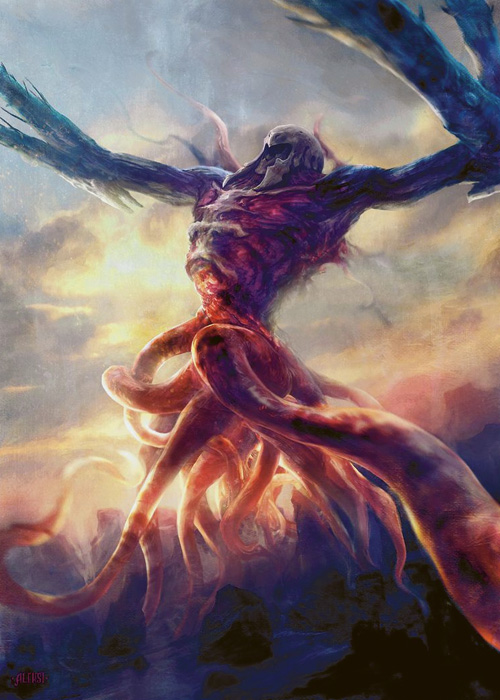
The earth shook again. The massive thing turned. It was coming toward them. And when it moved, the teeming masses in the valley surged forward, like iron filings aligning with a magnet.
"Combat positions!" yelled Nahiri.
The refugees were still. They were all staring past her, up, into the infinite distance between what they knew to be true and what their eyes now told them. What use were arms and tactics against an angry and misshapen god?
"Move!" yelled Lian.
The refugees stirred to action, taking up weapons, breaking camp, preparing to fight or to flee. Parents clutched their children. A man with a broken leg pulled himself upright, leaning on a spear for support.
The shaking was constant now, the earth rumbling. Clouds spiraled inward toward the monstrosity on the horizon, and chunks of earth floated into the air around it and began to break apart.
The first wave of chittering horrors reached the encampment. They squealed and screamed, mewled and howled, all snapping jaws and swiping claws and flailing tentacles and eyeless, bone-white heads. The smallest were the size of dogs. The largest were as big as buildings, lumbering through the horde. The small ones piled up against the wall, their fellows climbing over them to scale it.
Nahiri drew her sword. Sorin took up a position on one side of her, Lian on the other, and they met the onrushing tide of flesh and madness.
Sorin waved his hand, and a dozen of the monstrosities withered into dust. Nahiri focused her will, and dozens more sank into the rocky ground. But there were more, always more, and the largest one out there was a vortex that tugged on everything—their bodies, their minds, even their magic. Nahiri could feel her mana spiraling away even as she gathered it.
The ground lurched. Nahiri's hair began to stand on end. The setting sun silhouetted the monster before them—no, more than the sun. Light, a terrible light, like nothing any world should ever see. A chasm opened, splitting Nahiri's wall, glowing with the same otherworldly light. Nahiri willed it shut, but nothing happened.
It wasn't a crack in the ground. It was a crack in the world.
The plane was coming apart.
"What is that?" yelled Lian. Her face was bloody, but she still stood, sword in hand.
"That," said Sorin, his voice oddly calm, "is the end."
The light grew unbearable. Faintly, as though from a great distance, the people they'd spent weeks safeguarding screamed, and stopped screaming, and were swept away. Nahiri felt her body rise upward as the earth itself began to unravel.
"Nahiri!" said Sorin. "It's over!"
Beside her, Sorin flashed away into nothingness. She grabbed for Lian's arm, but the girl was gone, snatched away by shadows in the light. The sword she had carried was still there, floating in the blinding air.
Silently cursing herself, Nahiri grabbed the sword and left the world behind.
Zendikar. Home.
It had been their agreed-upon rendezvous, a safe place where no other Planeswalker would interfere. This world was under Nahiri's protection.
Sorin hadn't offered Innistrad as a rendezvous. Probably worried that the monstrosities would follow. He was too cautious, but perhaps caution was the natural result of age. He was at least a thousand years old, and she wondered sometimes what it would have been like to know him when he was young.
They sat in silence at the edge of a temporary kor settlement in the rugged highlands of Akoum, resting, restoring the bonds that supplied them with mana. If Sorin felt any trace of regret at how things had gone, none reached his face. Nahiri clutched the sword, the last trace of a now-dead world.
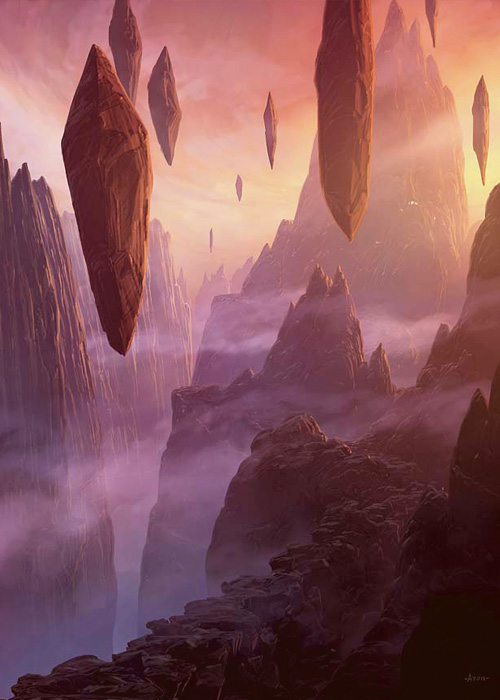
"Nahiri," said Sorin. "We've got company."
She felt it too, a sort of pressure in the air that meant something was emerging from the Æther. She stood, heart racing.
"Did they—"
"No," said Sorin. "Not big enough. But big."
Then he was there with them: a massive, ethereal dragon, shining with blue-white light. Two flat horns curved around and behind his head, mist poured off him, and long wings folded elegantly behind his slender body. He was huge, easily forty feet long, but he had appeared some distance from them, and everything about his posture spoke of peaceful intent. Nonetheless, Nahiri drew her sword.
"You have noticed," said the luminous dragon, "that we have a problem."
"There's no 'we' here, dragon," said Sorin, rising. "There's us, and there's you. And Zendikar is under her protection."
"Hello to you, too, Sorin of Innistrad," said the dragon. "And on the contrary, when it comes to this problem, 'we' means everyone, everywhere."
He turned his great head toward Nahiri.
"I am Nahiri, guardian of Zendikar," she said. She looked up into the newcomer's inscrutable eyes and tried not to seem afraid. "Whoever you are, you're here at my sufferance."
"Of course," said the dragon, bowing. "Well met, Nahiri of Zendikar, and thank you for your hospitality."
He turned back to Sorin.
Sorin's scowl deepened.
"Nahiri, this is Ugin, called the Spirit Dragon. He's as old as time, and about as easy to argue with."
Sounds like someone else I know, thought Nahiri.
"I take it you know each other," she said.
"We have worked amicably together in the past," said Ugin.
"Not recently," said Sorin. "Ugin, what do you want?"
"Your help," said Ugin.
He raised a hand and conjured a small, ghostly image of the enormous thing they had seen on the horizon of that doomed world.
"You were watching us," said Nahiri, realization dawning. "And you didn't help."
"There is a whole Multiverse of people to help," said Ugin, "and a multitude of ways to help them. While you were trying to stage a grand battle, I was watching, and learning, so that these creatures can be stopped in the long run. This is a goal the three of us share."
"That's my goal," said Nahiri. "But I question the moral judgment of anyone who views the destruction of an entire world as a research project."
"What have you learned about them?" asked Sorin, ignoring her.
Wonderful. The grown-ups were talking. He had done this to her before, when meeting with other Planeswalkers. But she trusted Sorin's judgment, for the most part. She would hear the dragon out.
"They're called the Eldrazi," said Ugin, "and they devour entire worlds. They are not true Planeswalkers, yet they move freely between planes. They are living organisms, apparently native to the Blind Eternities—the only such creatures known to exist. If they are not stopped, they pose a threat to every world."
"They cannot threaten every world," said Sorin. "The Multiverse is infinite."
"You clearly don't believe that," said Ugin. "If there are an infinity of worlds, then why save any of them? Why not just move to other worlds, ahead of the Eldrazi? No. The Multiverse is boundless, but its contents are finite. To believe otherwise is to believe that nothing matters at all. And when you are as old as I am, you will understand that nihilism is an indulgence you cannot afford."
Sorin frowned, but said nothing. Perhaps he really believed all those things he said about wisdom coming with age.
"How do we stop them?" asked Nahiri.
"That presents a dilemma," said Ugin. "They are creatures of the Eternities. What you saw ravaging that plane was a projection, a shadow of living Æther cast onto three-dimensional space."
Nahiri tried to picture living Æther, but in her mind's eye saw only the thing that had blotted out the sun. It had seemed solid enough.
"Hence the dilemma," Ugin went on. "If we face them in the Blind Eternities, we face their full power in an environment where even we can barely survive. But if we defeat only their physical extensions—no mean feat in itself, as you have seen—still we accomplish nothing, for their true forms reside in the Æther."
"We must find a way to destroy them," said Sorin.
"That may not be possible," said Ugin, "and it certainly isn't wise."
"Worlds are dying," said Nahiri. She rested her hand on the hilt of her sword. "What wisdom could there be in leaving these things alive?"
"Do you know what they are, Nahiri of Zendikar?" asked the dragon. He lowered his enormous head to look her in the eye. "Do you know if they inhabit some unseen ecology, or what will happen if they are destroyed? Do they deserve death? Does your moral judgment extend only to beings you understand? Can you answer any of these questions?"
He peered at Sorin.
"And Sorin, you of all people understand the necessity of balance."
The remark struck her as pointed, but she didn't know enough of Sorin's past to say for sure.
"You're speaking in hypotheticals," said Sorin. "I cannot imagine you so sanctimoniously urging caution if your world were in danger."
That seemed pointed, too. And Ugin hadn't said the name of his home world, had he?
"What is it you're suggesting?" asked Nahiri. "You say you want to stop them without destroying them. You must have a plan."
"We can imprison them," said Ugin. He conjured another illusion, this one a blueprint of some impossibly complex network of thousands of nodes and hundreds of gently curving lines. "Bind them to one plane using their physical forms as anchors, and force them into dormancy. Unlike killing them, that might actually work. And it would give me time to study them without allowing more worlds to fall."
"You think you can imprison all of them?" asked Nahiri.
"All three, yes," said Ugin.
"Three?" said Sorin. "Update your field notes, dragon. We fought thousands."
"You fought extensions," said Ugin with an airy wave of his hand. "Mere organs of a larger being. There are three true Eldrazi loose in the Multiverse. In their absence, their brood will wither and die, as surely as a hand or a foot. We lure those three to one plane and trap them there."
"This plane would be sacrificed?" asked Sorin.
"Risked, certainly," said Ugin. "But the means by which we cage the Eldrazi will also serve to put them into stasis. If we succeed, the world that imprisons them would be damaged, but not destroyed. If we fail, then yes, it is doomed. But it was doomed anyway."
"And what plane do you intend to…risk?" asked Nahiri.
Ugin looked around, his horned head sweeping to encompass the rocky vista of Akoum.
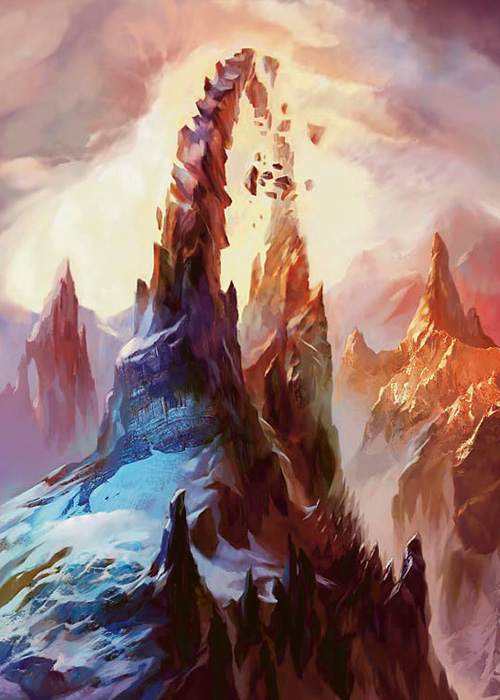
"It should be large," he said. "Rich in mana. Sparsely populated. Preferably a place where we can easily build a base of operations, a world that's not under the protection of another Planeswalker, and somewhere where one of us can keep watch on the Eldrazi as they slumber."
There it was. The ugly truth. After all that talk about doing the right thing…
"Innistrad doesn't meet those criteria," said Sorin. "Why not your home world, wherever it is?"
"It is also unsuitable," said Ugin. "We could search for such a plane, but it would take time. Time in which more worlds would fall. It would be better to begin immediately."
The two ancient Planeswalkers turned to Nahiri. Ugin was impassive. Sorin blinked his bright orange eyes slowly, like a cat stalking its prey.
She gripped the stoneforged sword, pulled from the earth of a fallen world.
"No."
"Nahiri…" said Sorin, in what she thought of as his aggrieved-parent voice. "You saw what they did to that place. You can keep it from happening again. You heard Ugin. If we succeed, Zendikar survives."
"Risked," said Nahiri. "Damaged. What gives me the right to put everyone here in danger?"
"What gives you the right not to?" asked Ugin. "I am telling you that we can risk one world to save all others. And all worlds, including that one, are already at risk. The choice is obvious."
He lowered his head to look her in the eye.
"If you would prefer not to put your own world in danger, we can take the time to find another plane that meets our needs. If it is defended by a Planeswalker, we convince its guardian to cooperate—by force, if necessary. If it is undefended, we simply begin."
"And what gives us the right?" Nahiri asked again. "Yes, fine, risk one world to save the others. If we can stop these Eldrazi, maybe…maybe that means we have to. But what gives us the right to choose which world must bear the burden?"
"What alternative is there?" asked Sorin. "Shall we take a referendum?"
"That is why I chose Zendikar," said Ugin quietly. "Because it does have a protector, someone who has already chosen to take its destiny into her hands. Someone who will do the right thing."
"And if I refuse?" asked Nahiri. "Will you 'convince' me by force?"
"No," said Ugin. "Because I also need your help."
Sorin and Nahiri looked up at the luminescent dragon.
"The two of you possess skills I lack," said Ugin. "And the job is too big for one Planeswalker alone, no matter how powerful. Three of them, three of us. Together, we can save everything that is."
Nahiri knelt and pressed her hand to the ground. Akoum was highly volcanic, and the ground pulsed with the heartbeat of shifting magma. She reached out further, to rolling Ondu and river-crossed Tazeem and boiling, sulfurous Guul Draz. She felt Zendikar, all of it. But its people were mysteries to her, their footprints silent against the rumbling backdrop of the living earth.
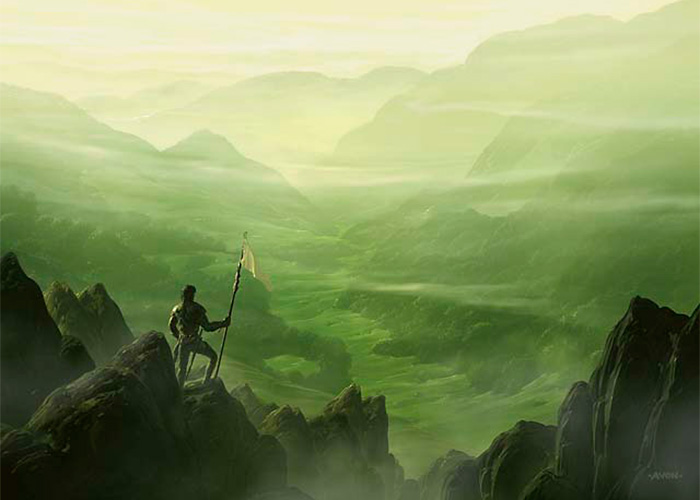
She thought of those cracks in the world, of white light spilling out of nowhere and nothing to draw all of this into the void.
They would come here eventually, if they were not stopped. They would come, and when they did, she would not be able to protect her world. And if she trapped them on some other world, to save her own, how would she forgive herself? The air of her beloved home would hold a guilty tang forever.
Zendikar was strong. It could withstand the Eldrazi long enough to trap them. Zendikar would be their prison, Nahiri their jailer, one world and one Planeswalker standing steadfast to protect all others.
She stood, gazing out over the rugged beauty of Akoum.
"What's the plan?"
Ugin's preparations had been thorough. He had worked out a way to trap the Eldrazi using a carefully shaped network of leylines and magical nodes. What he needed was someone to build it.
Nahiri was very good at building things.
It took forty years of near-constant work. One by one, she pulled carefully crafted stone shapes out of the earth—hedrons, Ugin had called them, and the name had stuck. She filled the skies of Zendikar with stone, and Ugin etched them with draconic runes that held them in the air and would bind the Eldrazi to this place.
The hedrons were lure as well as trap, sending out pulses of magical energy that drew the Eldrazi like the scent of blood draws sharks. Slowly, ponderously—and, Sorin reported, ignoring other worlds along the way—the Eldrazi approached Zendikar.
Nahiri spread word throughout the plane of what was coming, to the merfolk, the kor, the humans, the elves. The amphibian surrakar whispered to each other in the bubbling depths of the coming of monstrous gods, and the angels of Zendikar patrolled the skies between the hedrons with watchful eyes.
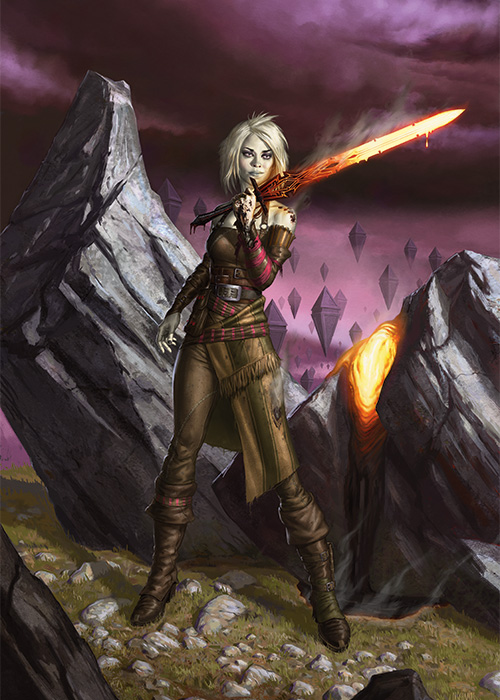
Art by Eric Deschamps
When the Eldrazi came, Zendikar was as ready as any world had ever been.
One Eldrazi titan in the distance had been monstrous, an abomination. Three, together, seen up close, were an impossibility.
The one Sorin and Nahiri had seen before, the enormous thing that Ugin called Ulamog, was in fact the smallest of the three. The titan called Kozilek picked its way through the hedron fields, great black blades of senseless obsidian floating around what should have been its head. And above them, in every sense, was Emrakul, a hideous tower of latticed flesh and grasping tentacles floating lazily over the shattered earth.
Ugin breathed his ghostfire, searing the Eldrazi brood with invisible flame. Sorin countered their life-draining power with his own, leeching their strength before they could take too much of Zendikar's vitality. Zendikar's people fought the titans' brood lineages, but it was clear that if the onslaught continued, they too would be overrun.
The titans were heedless, mindless, making their inexorable way to the nexus of the hedron network, the source of the call that pulled them here, the eye of the storm.
Nahiri was waiting for them, in the underground chamber that she and Sorin had named the Eye of Ugin. For Sorin, it was likely mockery. For Ugin, it might be pride, although it was difficult to tell. For her, it was a message: Remember, dragon. This was your idea.
There was a rush of mana, and then Sorin and Ugin were there with her. The earth shook, the crystalline walls of the Eye singing in sympathetic vibration.
"They are in position," said Ugin.
The three Planeswalkers focused their tremendous power on a single point, a nexus stone linked to every other hedron by invisible lines of force and mana.
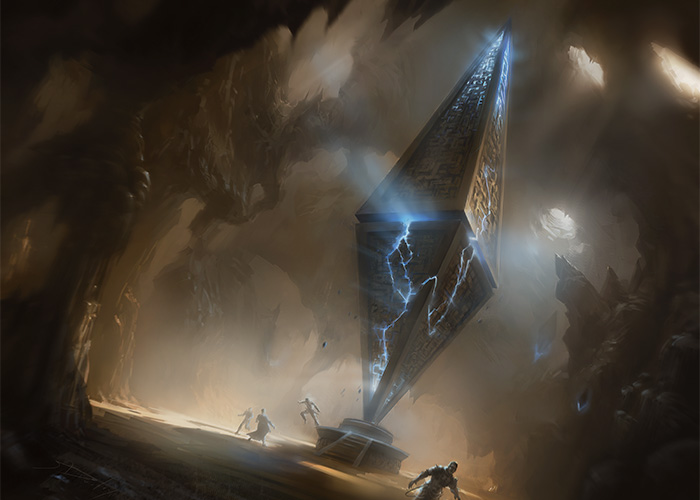
Every single hedron on the plane glowed as they shifted into new positions. The network was taking its final shape. From icy Sejiri to the Silundi Sea, Zendikar quivered with effort.
Then it was done.
They sealed the chamber with a mystical lock, one that could only be opened by three Planeswalkers together, and made their way to the half-ruined surface.
Looming above the highlands of Akoum, the three Eldrazi stood petrified, surrounded by a web of floating hedrons. Nahiri knew the earth here. It was already reacting, growing around the great Eldrazi like a scab over a wound. The teeth of Akoum would swallow them, and the inhabitants of Zendikar would scour the plane of their brood. Zendikar had survived, ravaged but whole, and its people would learn to live in the shadows of the hedrons.
"Well done, Nahiri," said Sorin. "This was your work. Your sacrifice."
The three of them would test the strength of the lock, make sure the titans were secure. Perhaps Sorin and Ugin would help her scour the land of the Eldrazi broods. She hoped so. And then, sooner or later, the two elder Planeswalkers would depart, and Nahiri—and the Eldrazi—would remain.
She stared up at the silent, stony shapes. Ramparts of stone already crept up around them. Perhaps in a thousand years they would be forgotten, their destruction fading into legend. But Nahiri would not forget them, and neither would the land itself.
"This was our work," she said. "My work is just beginning."
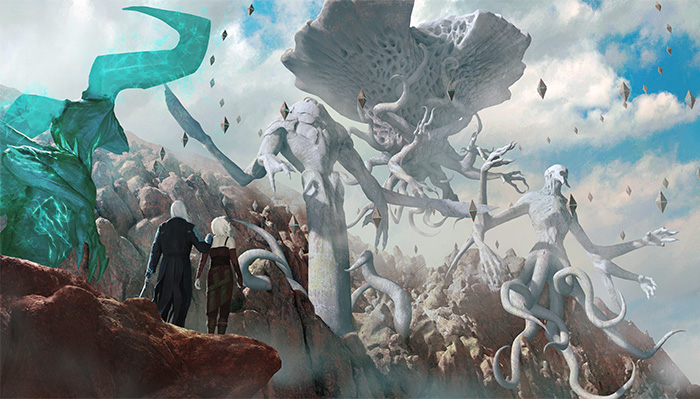
Art by Igor Kieryluk

